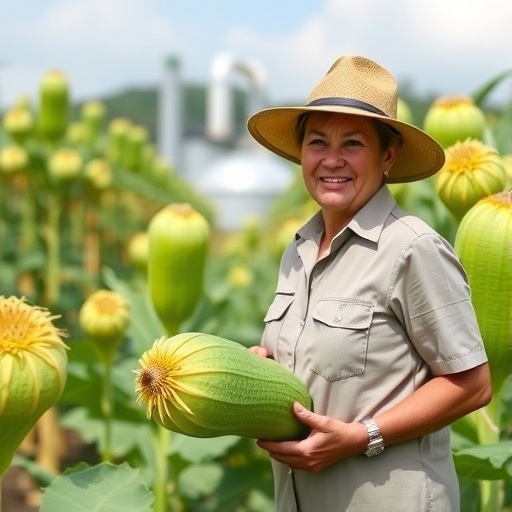In an innovative approach to address both environmental sustainability and socio-economic challenges, a recent study has explored the feasibility of Integrated Community-scale Biorefineries in regions significantly affected by violence. The research, led by Sichel-Crespo et al., delves into how tropical residues can be valorized, fostering not only ecological resilience but also economic opportunities in marginalized communities. This ground-breaking work highlights the potential of biorefineries as a transformative model for regions grappling with both resource scarcity and social instability.
The concept of a biorefinery is not new; however, the application of this model at a community scale, particularly in violence-affected areas, presents a novel twist on existing practices. These small-scale biorefineries can process agricultural and organic residues into valuable biofuels, chemicals, and other products that could replace fossil fuel-based industrial processes. This shift not only contributes to a reduction in carbon emissions but reinforces local economies, providing jobs and reducing reliance on external markets.
Tropical residues are abundant in agricultural zones, often seen as waste with little value. However, the study reveals that these materials can serve as a feedstock for biorefineries. By utilizing agricultural by-products, these facilities can transform what is considered waste into a resource, allowing communities to harness the economic potential of their environmental assets. This fits perfectly into the circular economy framework, which emphasizes the sustainable use of resources and waste reduction.
The research emphasizes the interconnection between environmental sustainability and social stability, particularly in areas plagued by violence. The instability often limits access to traditional markets and disrupts economic activities, leaving communities vulnerable. Integrating biorefineries within these communities not only provides a pathway to economic stability but also fosters social cohesion. As local individuals come together to participate in the biorefinery’s operations, they enhance community bonds, build trust, and create platforms for collaboration.
A critical component of the study focuses on the socio-economic impact of implementing biorefineries. By providing local employment opportunities, these facilities can help alleviate poverty, diminish youth unemployment, and reduce the allure of joining violent groups. Moreover, the training and skills development associated with operating biorefineries enable community members to gain valuable expertise, leading to improved job prospects and overall quality of life.
Furthermore, the potential for biorefineries to stimulate local entrepreneurship is particularly significant. Local entrepreneurs can engage in various aspects of the biorefinery process, from collection and transportation of feedstock to production and distribution of end products. This decentralized approach allows communities to retain control over their resources and generates additional income streams that were previously unattainable.
Investments in biorefineries also have the potential to attract funding and support from both governmental and non-governmental organizations aimed at promoting sustainable development. Regulatory frameworks increasingly favor bio-based processes, leading to financial incentives for communities adopting such technologies. Thus, successful implementation could position these regions as models for sustainable development, inspiring similar initiatives globally.
Despite the promising prospects, the study does not shy away from addressing the challenges associated with establishing community-scale biorefineries. Issues such as initial capital costs, technology access, and the need for effective management systems are highlighted as potential barriers. However, the researchers emphasize that these challenges can be mitigated through collaborative efforts, public-private partnerships, and targeted investments in capacity building.
The environmental benefits of biorefineries extend beyond the reduction of waste; they contribute to soil preservation and improve agricultural sustainability. By recycling organic residues back into the ecosystem, these biorefineries can enhance soil quality, reduce the need for chemical fertilizers, and promote biodiversity. This regenerative approach underscores the dual benefits of improving local economies while also safeguarding the environment.
Moreover, the ability to produce clean energy through biorefineries addresses the pressing issue of energy access in many parts of the world. In violence-affected areas, where infrastructure may be compromised, local biorefinery projects can provide reliable and sustainable energy sources, empowering communities and enhancing their resilience to external shocks. Such energy independence is critical for fostering stability and reducing vulnerability to further violence.
Public awareness and community engagement are pivotal to the long-term success of these biorefineries. The transition to a resource-based economy necessitates a cultural shift where communities recognize the value of their residual biomass. Programs aimed at educating community members about the benefits of biorefineries and how they work are essential. Building a sense of ownership over the process can galvanize support and ensure sustainability.
Given the complex interplay of social, economic, and environmental factors in violence-affected areas, the research findings present a compelling case for developing integrated biorefineries. The potential benefits stretch far beyond just environmental impact; they encompass significant social and economic advantages that could reframe the future of these communities. This holistic view is essential for addressing the multifaceted nature of underdevelopment in areas impacted by violence.
As the study concludes, the implications of Integrated Community-scale Biorefineries extend beyond local contexts, posing critical considerations for sustainable development globally. By championing local solutions to global challenges such as climate change and social instability, such initiatives illustrate the power of grassroots innovation. The path forward is not without challenges, yet the promise these biorefineries hold could redefine the nexus of sustainability and community resilience.
The research led by Sichel-Crespo et al. is a clarion call to rethink our approaches towards waste, energy, and community empowerment in the developing world. By embracing such innovative strategies, we can pave the way for a more sustainable and equitable future that transforms both the environment and the lives of countless individuals.
Subject of Research: The feasibility of Integrated Community-scale Biorefineries using tropical residues in violence-affected areas.
Article Title: Integrated Community-scale Biorefinery as an Approach to Valorize Tropical Residues in Zones Highly Affected by Violence.
Article References:
Sichel-Crespo, C.M., Ortiz-Montoya, E.Y., Bermudez, A.C. et al. Integrated Community-scale Biorefinery as an Approach to Valorize Tropical Residues in Zones Highly Affected by Violence. Waste Biomass Valor (2025). https://doi.org/10.1007/s12649-025-03300-5
Image Credits: AI Generated
DOI:
Keywords: Integrated biorefineries, tropical residues, community empowerment, waste valorization, violence-affected areas, sustainable development.




